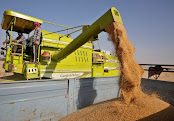The record prices are likely to lift retail inflation, which
eased in November last year after surging to a 14-month high in October, and
could influence the central bank's decision on interest rate cuts.
"Wheat supplies are limited in the market. Even after
paying record prices, flour mills are unable to secure enough to operate at
full capacity," said Ajay Goyal, managing director of Shivaji Roller Flour
Mills.
In December 2024, New Delhi lowered the limit on wheat
stocks that traders and millers can hold to help boost the grain's availability
and moderate prices.
But the curbs failed to bring down prices, which were
trading around 33,000 rupees (US$384.66) per metric ton in New Delhi, up from
24,500 rupees in April and far above the government fixed minimum support price
of 22,750 rupees for last season's crop.
The stock limit failed to improve supplies and bring down
prices, indicating that private players are holding few supplies, and the
government needs to sell more wheat from its reserves to bulk consumers, said
Pramod Kumar, a flour miller.
The state-run Food Corporation of India (FCI) is selling
100,000 metric tons of wheat to bulk consumers every week, but this is not
sufficient to meet demand, as private players' sales are falling, Kumar said.
In November, the government announced plans to sell 2.5
million tons of wheat from state reserves to bulk consumers in the year ending
March 2025. This is significantly lower than the nearly 10 million tons sold in
the previous season.
The surplus wheat with the FCI is limited, preventing it
from offering more to private players, said a New Delhi-based dealer with a
global trade house.
Wheat
stocks in state warehouses totaled 20.6 million tons at the start of December,
slightly higher than the previous year's 19.2 million tons, but far below
five-year average of 29.5 million

Pakistan must secure its highly porous border with India, else huge quantity of wheat will be smuggled to India. Price difference is a huge incentive for smugglers.
ReplyDelete